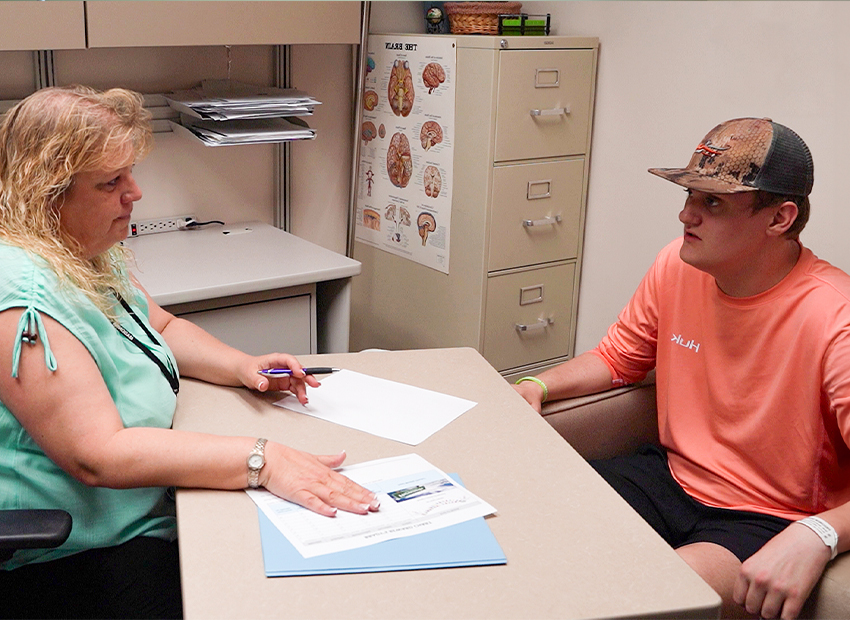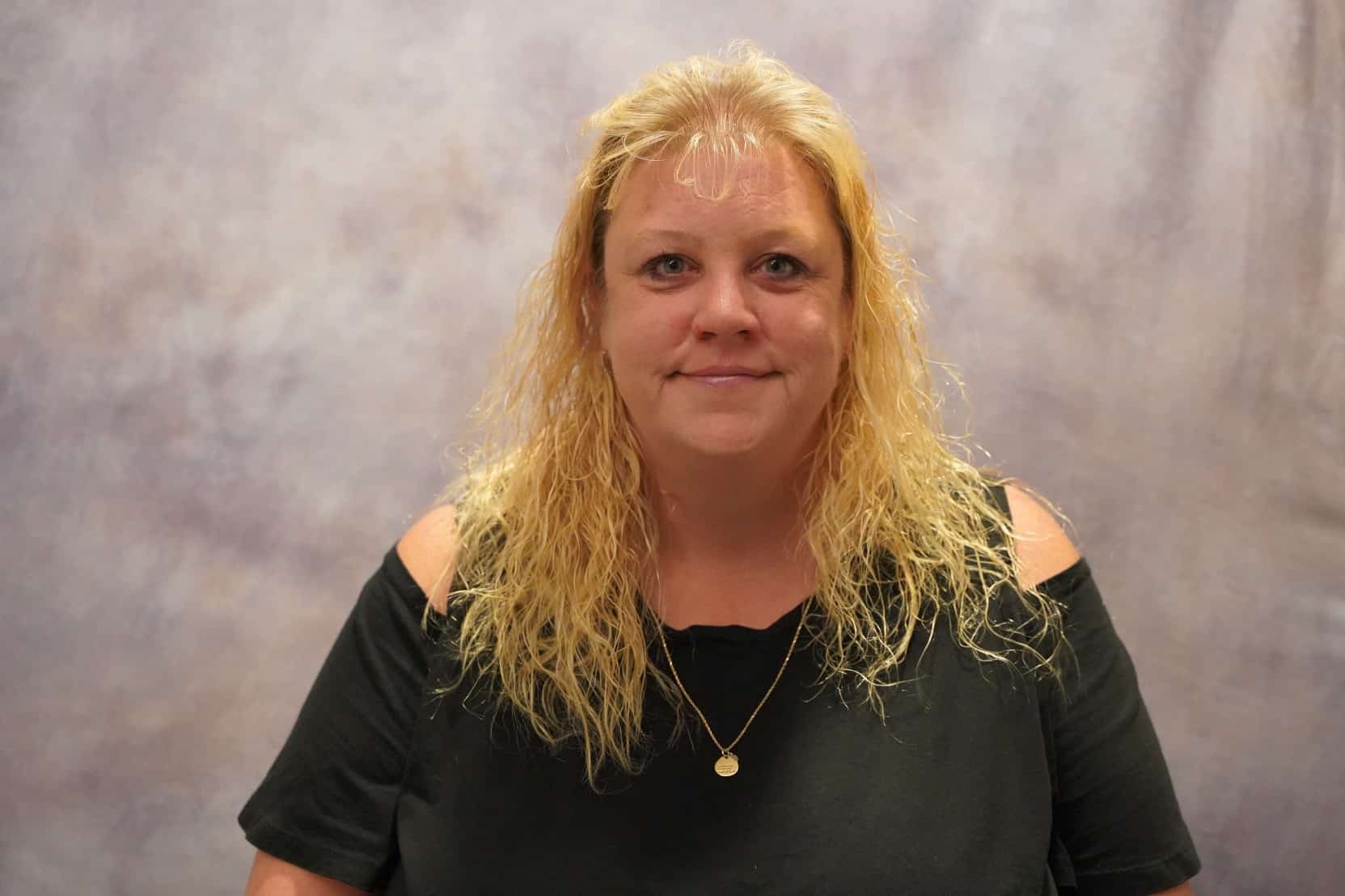NeuroPSYCHOLOGY

Program Overview
Madonna’s neuropsychology services support patients who have had a stroke, spinal cord injury, brain injury, neurodegenerative disorders, or other conditions as they work to reclaim their lives and participate in the community. While many rehabilitation hospitals outsource neuropsychology services, Madonna psychologists and counselors are integral members of the patient care team, working collaboratively with other clinical staff. Services are offered on both an inpatient and outpatient basis.
What is a Neuropsychologist?
A neuropsychologist is a licensed psychologist with advanced training in how behavior and cognitive abilities are related to brain structure. A neuropsychological assessment includes standardized testing in memory, attention, reasoning, and other skills. Test scores are compared to norms, usually corrected for age, gender, and education, allowing for accurate judgments about the extent of cognitive impairment and the patient’s residual strengths. Test results can aid in recommendations for easing the return to home, community, work and school.
Benefits of Neuropsychology
While many rehabilitation centers outsource neuropsychology services, Madonna staffs psychologists and counselors who are integral members of the patient care team. Psychologists actively work with patients to address difficult problems, such as substance abuse, altered sexual functioning and changing life roles. Madonna’s philosophy is to address these issues early in recovery, rather than wait for them to emerge later as serious obstacles. Psychologists are in a position to approach such problems in a knowledgeable, diplomatic, and experienced manner.
When to Consider Seeing a Neuropsychologist
Patients with some of the following concerns or problems may benefit from working with a neuropsychologist:
Questions about cognitive functioning, such as the ability to work, drive, or manage finances
Concerns with memory loss or dementia
Problems with emotional adjustment to a medical or physically-disabling condition
Mild traumatic brain injury or sports concussion
Difficulties with behavioral changes following a brain injury
Legal concerns related to cognitive injuries (such as guardianship or personal injury legal proceedings)
Difficulties with school or work re-entry following an injury
Range of Services
A variety of services are offered, including neuropsychological assessment, adjustment counseling, pain management, family therapy, concussion/mild brain injury evaluation, memory testing, dementia evaluation, neurofeedback, biofeedback, behavioral management and psychoeducation.
Innovative Research
The department works closely with Madonna’s Institute for Rehabilitation Science and Engineering. Department members are actively involved in generating original research in a number of areas, including youth sports concussion, neuroplasticity, holistic treatment of neurological conditions, mild TBI rehabilitation, and data-based rehabilitation team decision-making.
Clinical Expertise
Several members of Madonna’s neuropsychology department have national board certifications, the highest level of professional qualification in psychology, including ABPP and ABPN certifications in clinical neuropsychology and clinical psychology.
Lincoln Campus

Neuropsychology

Neuropsychology

Neuropsychology

Neuropsychology

Neuropsychology
Omaha Campus

Neuropsychology

Neuropsychology

Neuropsychology

Neuropsychology

Neuropsychology

Neuropsychology
Neuropsychology Services
The Madonna Outpatient Neuropsychology Services provide comprehensive assessment services for teenage, adult and geriatric patients when problems with thinking or memory are evident or suspected. Neuropsychological assessment provides a thorough analysis of the brain’s functioning in many areas and the results can be used to develop or refine a diagnosis of cognitive difficulty. Our neuropsychologists can then provide recommendations for treatment for better functioning at home, school or work.
Frequently Asked Questions
How Should I Prepare for My Neuropsychological Assessment?
Please bring any questionnaires provided by the neuropsychology team with you. These questionnaires must be completed so that your appointment is not delayed.
Please eat before the appointment, as the evaluation lasts several hours. We may break for lunch and there are several dining options available in the hospital or nearby. You are also welcome to bring snacks.
Please take your regularly prescribed medications as scheduled. Avoid optional medications that can cause drowsiness, such as painkillers, anti-anxiety and allergy medications. Anyone taking attention medications should check with staff for further instructions.
What Should I Bring with Me?
Please bring a list of your current medications and dosages.
Bring your reading glasses or hearing aids.
Bring a valid photo ID and insurance card.
Bring any questionnaires provided by the team, fully completed.
What Will the Assessment Include?
A neuropsychology assessment is a comprehensive evaluation of cognitive thinking and behavioral abilities using a set of standardized tests and procedures. The specific tests administered depend on the reason for referral and may be different for every patient. Neuropsychologists may evaluate:
- Intelligence
- Attention and concentration
- Mental efficiency
- Learning and memory
- Problem-solving, reasoning, planning and organization
- Language and speech
- Visual perception and spatial abilities
- Sensory perceptual and motor abilities
- Emotions, behavior and personality
What Conditions Would Benefit from an Assessment?
Madonna outpatient neuropsychology services can provide assessment and treatment recommendations for a wide variety of conditions that may affect behavior, including:
- Cognitive and emotional effects of various neurological conditions, including, for example, Alzheimer’s disease, stroke, epilepsy, multiple sclerosis (MS), leukemia, brain tumors, Parkinson’s disease, and chromosomal disorders
- Traumatic brain injury and electrical shock injury
- Cognitive decline in elderly patients
- Changes in thinking abilities associated with various medical conditions, including metabolic disorders, HIV infection, cardiac complications, liver disease, toxic exposures, and autoimmune disorders (e.g., Lupus) among others
- Autism and related neurodevelopmental disorders
- Transition from adolescence to adult planning
- Attention deficit disorder (ADD)
What Happens After My Assessment?
A report will be sent to your referring physician usually within 2-3 weeks. A follow-up appointment may be scheduled with the neuropsychologist to discuss your strengths and any areas of concern. They will provide individualized guidance and next-step care recommendations. To obtain copies of your report, you will need to contact Medical Records or your physician. It is up to the discretion of the neuropsychologist to allow the release of this report without a formal feedback session.
Is Neuropsychological Testing Covered by Insurance?
Neuropsychological testing is usually covered by insurance companies for medically necessary assessments. Some types of evaluations, such as learning disabilities assessments or court-ordered services, may not be covered. Second opinions may not be covered.
Please note that neuropsychologists will submit billing based upon all of the time involved in conducting the assessment, including information gathering, scoring interpretation of the test, and report writing. Thus, the hours billed will be more than the time that you spend with the neuropsychologist.
How do Assessments Contribute to My Health?
Assessments may contribute to clinical decisions about:
- Rehabilitation planning
- Educational planning (including IEP, 504 plans and ADA evaluations)
- Ability to return to work or school
- Ability to function and live independently
- Tracking of changes in cognitive ability over time to determine response to medication or disease progression




